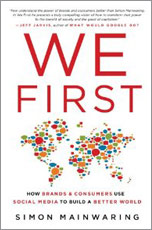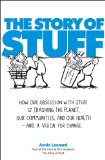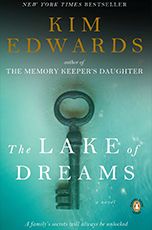 By Simon Mainwaring
By Simon Mainwaring
Palgrave Macmillan | 256pgs
Release Date: June 7, 2011
Summary:
Simon Mainwaring, a branding and social media expert who has worked with the world’s most influential corporations, proposes a new business paradigm in We First: How Brands and Consumers Use Social Media to Build a Better World. He envisions a world where companies leverage social media not only for profit, but for the improvement of the community as well. Mainwaring contends the “Me First” corporate greed mentality is unsustainable and harmful to society. Instead, the book offers an alternative to corporations and consumers, where decisions in the production and purchase of goods are made for the benefit of greater good. The idea of “contributory consumption” is introduced, where each commercial interaction contributes to the betterment of the environment, and the world at large. Case studies from global giants such as Pepsi, Toyota and Nike are used to show how new strategies can achieve success. Read more…

 By Annie Leonard
By Annie Leonard
Free Press | 352pgs
Release Date: March 9, 2010
Environmentalist Annie Leonard continues the conversation on over-consumption started in her internet documentary The Story of Stuff in her new book The Story of Stuff: How Our Obsession with Stuff Is Trashing the Planet, Our Communities, and Our Health-and a Vision for Change. Expanding on the material in the film, Leonard discusses the five stages of consumer goods: extraction, production, distribution, consumption, and disposal, and how these stages are damaging the environment and lowering the quality of life. Through in-depth research and first hand experience visiting landfills and factories throughout the world, the author illustrates how natural resources are being depleted and how the toxic by-products of manufacturing material goods are ruining people’s health. The never-ending quest for more “stuff” forces many people to work more, enjoy life less, and fill garbage pits with discarded junk. In the face of this consumption crisis, Leonard suggests a shift in societal values towards emotional well-being, rather than material gain, re-adjusting the work-life balance, and introducing strict legislation world-wide to stop the environmental erosion.
Read more…

 By Simon Mainwaring
By Simon Mainwaring

